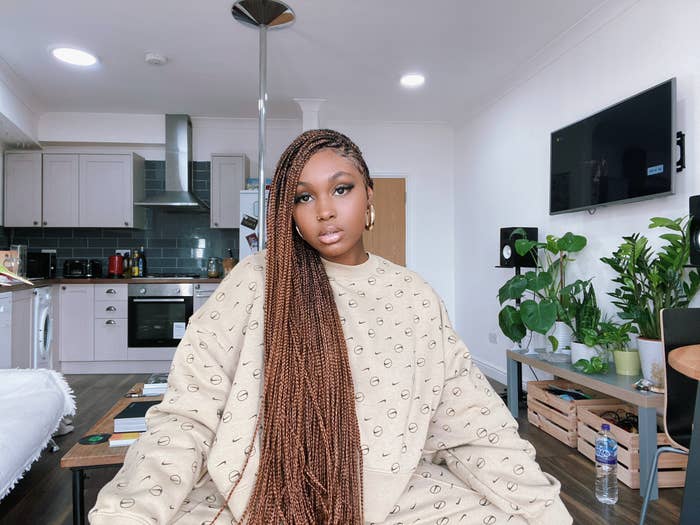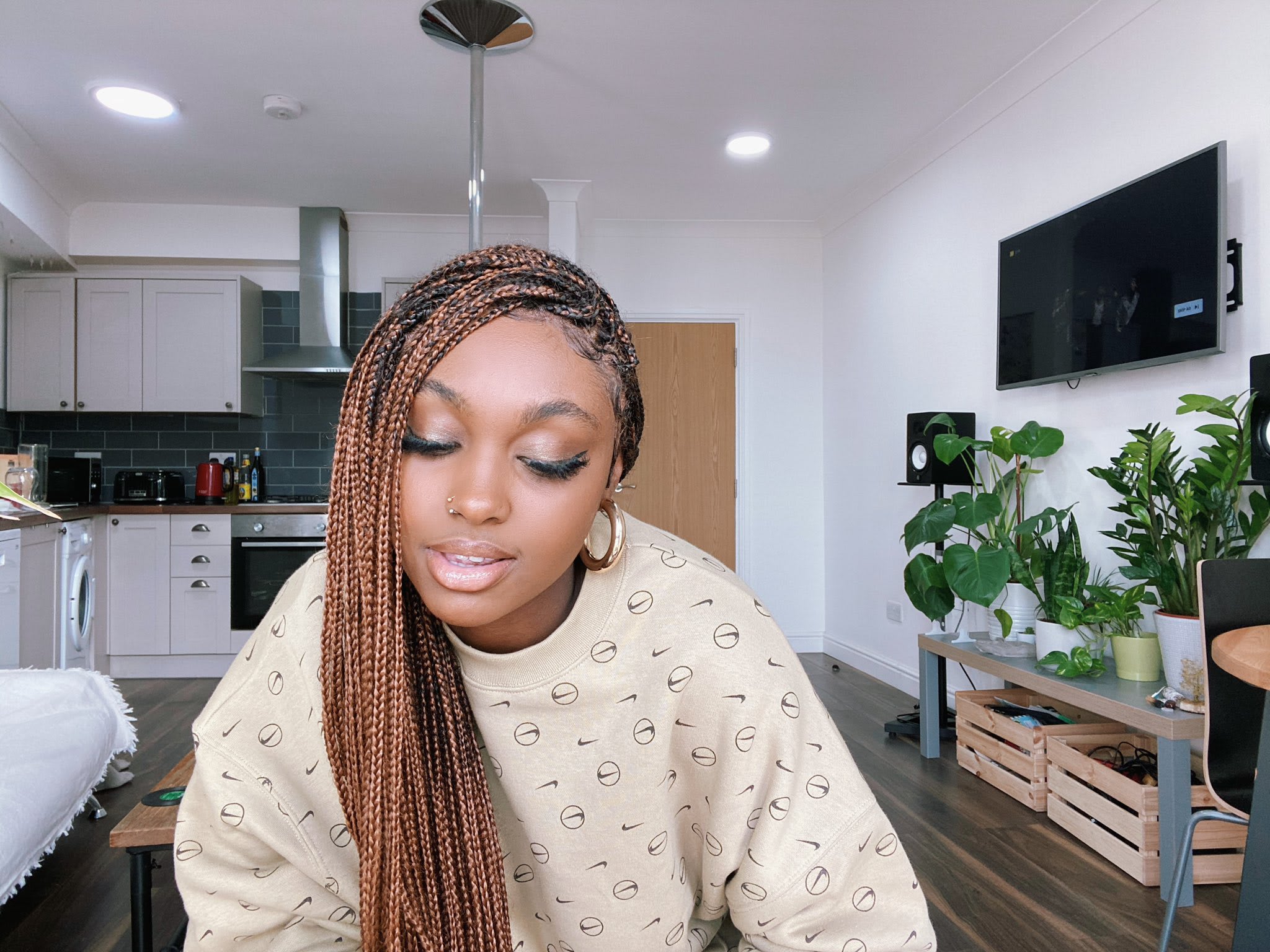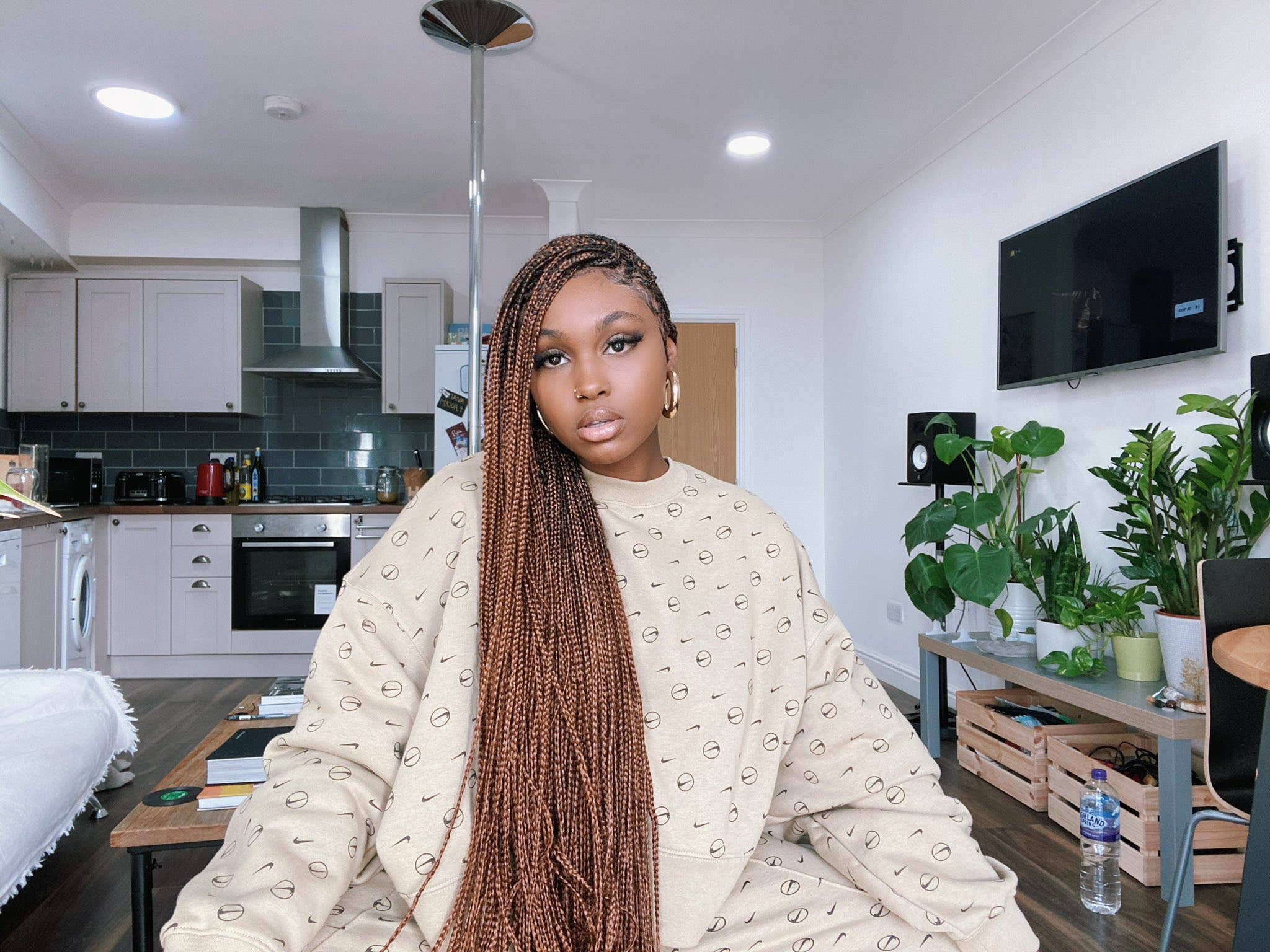
Born and raised in Newham, Tiana Major9 still enjoys frequenting East London. “I like walking around Shoreditch,” she tells me over Zoom, “going out there in the evening time and just being there and bumping into people.” With her profile rapidly ascending, the now globally-visible R&B-soul act hopes to still be able to enjoy local events like Recess after the pandemic eases up. “As it stands now, I’m not famous,” she insists. “But I definitely still want to go to local stuff. That’s my vibe.”
The singer-songwriter makes it known that she’s an introvert at heart who sometimes enjoys socialising, but ultimately finds solace in being reclusive. “I’m starting to realise now that this is my business: talking to people all the time, every day. It’s great, but it can be overwhelming at times.” This reclusiveness stems back to her childhood, when she first fell in love with music. Having attended the Pentecostal church COGIC (Calvary Church of God in Christ) since she was 5, she knew then that becoming a singer would be her eventual vocation: “It was seeing people my age at the time, kids, singing with the older members of the church—that made me relate to music first-hand.” Being associated with a brand of church that has housed prestigious musical talent, like Mary Mary, Kim Burrell and Dorinda Clark-Cole, helped to instill a foundation in singing for Tiana, which she’s grateful for to this day.
Two years later—at the age of 7—she crafted her first song, which she cringes at on its mention. “We were on a school trip...” Gathering her thoughts, she continues, half-chuckling over Zoom: “I remember being on the coach and me and my friend just came up with this new song. But I took it quite seriously after that and tried to bring it to my cousin, who was a producer at the time, to get it cut.” After telling her that she was not ready, Tiana took her cousin’s advice and worked on her sound over her teenage years with the support of her mother. “My mum actually wanted me to be an artist; she really did push me in that direction and was very supportive. I actually got to go to specific performing arts schools and on courses because of her.”
Following an underground buzz in the wake of her singles “Mr. Mysterious” and “Levee (Let it Break)”, Tiana unveiled her debut EP, 2018’s Rehearsal @ NINE, which presented a smoky, unapologetically British soul singer marinated in contemporary jazz. Rehearsal @ NINE—created in large part by her and her brother—was expansive in its use of raw instrumentals, with Tiana’s vocals sounding equally as pure, instantly inviting listeners into her orbit. “My brother was very helpful,” she says. “Even though he didn’t do a lot of music then, he was able to work with me to support me on the first EP.” But her real breakthrough came a year later, in the summer of 2019, when an opportunity to feature on Queen & Slim’s soundtrack was placed into her lap. “After I signed to Motown, they were curating the soundtrack and my A&R asked me to feature, what with me being a new signee and the type of music that I make. Once I’d read the script, I just knew I had to be a part of it.”
That track was called “Collide”—a collaborative effort with ATL soul-rap outfit EARTHGANG—which, for Tiana, was a strong introduction into the American music market, and peaked inside the Top 10 of Billboard’s Adult R&B Songs Chart earlier this year. Going on to win a Black Reel Award in the States last year, Tiana quickly began to garner international acclaim, leading to a plethora of MOBO Award nominations as well as a Grammy nomination for Best R&B Song. The 25-year-old artist also shared her sophomore EP, At Sixes And Sevens, in August 2020, honing in on more introspective themes, such as love and self-worth, while sonically flirting with reggae and funk. “I have more confidence in my writing now,” she explains, “and that’s why I was more expressive. I can’t even put a name on the actual sound now, because I’m inspired by so much.”
As she gears up to release the remix edition of her At Sixes And Sevens EP on April 2, which features R&B contemporaries from across the world, we get to know all about Tiana Major9.
“I think I’ve gotten to the point in my career where I feel like I’m going to be genreless.”
COMPLEX: You’ve stated before that you knew from the age of 5 that you wanted to sing. Was there a specific moment for you?
Tiana Major9: It was seeing people my brother’s age at the time, 16, being able to really sing. It was seeing that community and people who were older and younger that made me feel like, “Wow! I’d love to do that, too.”
I imagine you saw a lot of that in church. What was it like growing up as a member of the prestigious COGIC church?
It’s one of the biggest Pentecostal denominations in America, with branches in the UK and the Caribbean. Singers like Donnie McClurkin, Mary Mary, all of those people went to COGIC. You have to go there in your best dressed; there’s shouting; we used to sing all the hymns; people get in the spirit with the all big choirs in the back. It was fun!
At seven years old, you crafted your first ever song. Tell me about that experience.
We were on a school trip [laughs]... I can’t remember exactly where we were going, but on the way back to school, I remember being on the coach, talking and singing and having fun. Then me and my friend just came up with this new song on the spot! The lyrics, the melody—everything. I took it quite seriously after that and tried to bring it to my cousin, who was a producer at the time, to get it cut. He said that I wasn’t ready, though, so I left it.
How did your family react when you shared your aspirations of wanting to become a singer?
My mum actually wanted me to be an artist in the creative fields. She wasn’t a musician or actress or anything, but she really did push me in that direction and was very supportive. I actually got to go to specific performing arts schools and on courses because of her. My brother plays the guitar and ended up helping me to write on my first EP, and my other cousins do music too. My grandma even plays the guitar [laughs].
Thinking about your voice, it’s extremely textured and robust. Are there any musical figures you’ve gained inspiration from when it comes to vocal control?
I never say this in interviews, but Beyoncé. There was a period of time when I actually studied her voice and the way she executed it. She’s really good. I also studied Lauryn Hill and Jazmine Sullivan. Those three have it, man. One Beyoncé song that I always, always go back to is “Deja Vu”. Vocally, she goes so crazy on that song.
I have seen you referred to as solely an R&B artist, but there are elements of soul and jazz in your discography too. How would Tiana Major9, in 2021, define her sound?
For a while it was nu-jazz, but now, I dunno. I think I’ve gotten to the point in my career where I feel like I’m going to be genreless; when I write, when I meet new people and experience things, and in my listening too. If you listen to my EP, At Sixes And Sevens, you can’t put a finger on what it is. Obviously, there’s a sound there and it all feels like a Tiana Major9 project, but I don’t know what to call it. I feel like solely R&B is lazy.
In 2019, Stromzy featured you on his Heavy Is The Head song “Rainfall” and also on his Elle ‘Collective Power’ cover. When did you both first meet?
That was an incredible honour, and an incredible cover. I think I first met him when I was supporting Ray BLK at her first headline show at Hoxton Bar & Kitchen. He was in the green room—it was a small shoebox room, in reality. I think Kojey Radical was there and a few other artists, and Stormzy approached me and said, “Nice to meet you.” Then he realised I was supporting Ray and he made the connection that I’m an artist. He liked my music and then followed me on Twitter; we didn’t meet again for a while, but he would always share my music. I feel like I’m missing so much out, but the opportunity came to work with him and I was all for it. Big up Stormzy, man.
Thinking about your Motown signing, it feels aligned with your offering as an artist. Were there other offers on the table last year?
There weren’t any other offers when Motown was ready for me, but I was doing the rounds with my manager at the time. I’d been to pretty much every label for a while. Some labels really gas it, though. It comes from a good place some of the time, but sometimes it felt like they just wanted to meet me for a tick-the-box kind of thing. But Motown actually approached us, and I’m glad I went with them.
“The UK is always home and I built my fanbase here. But in terms of interaction and people who are looking for something different, there’s limitations here.”

There’s often commentary across social media about the UK not supporting artists, such as yourself, who sit in the realm of R&B, soul and jazz. Do you think there’s any truth to this?
Part of me feels that too, but I see the other side also. The UK is always home and I built my fanbase here. But in terms of interaction and people who are looking for something different, there’s limitations here. Especially if you’re a Black woman, they aren’t really looking for you. Unless you come across me naturally and like the music, of course, but most aren’t willingly looking for that. But, at the same time, you have to be patient and allow people to find you—sometimes people aren’t ready to hear you yet. Even I find music late sometimes.
You’ve mentioned that you don’t like too many people in the studio when you record—what’s your process like when crafting new songs and projects?
I’m very used to being in the room with just one musician. Like my brother, in the past, and him playing the guitar and us creating the song from the first note to the end of the song—that’s my ideal. I always go back to that. But recently, I’ve been in the studio working with producers in a similar way, or even more new to me: a producer having beats and folders ready for me. You can find real gems sometimes, but it can also be a little limiting. A lot of the time, it’ll be loops—the same beat for three minutes—and I don’t feel like my music is that, so it’s quite challenging because I’ll want to change or add things. There’s also a producer called PRGRSHN—he helps with my vocals, vocal production and song production. I love having him in the room. It’s always good to have familiarity when you’re recording.
At Sixes And Sevens feels a lot more introspective in relation to its predecessor, Rehearsal @ NINE. Would you agree?
That’s accurate. I felt like I wanted to get deeper and let people in a bit more. There were thoughts that I had for a very long time that I disguised in poetry, or didn’t get deep into, but for this project I said, “Bun it! I’m gonna say what I want this time.”
What’s the meaning behind the title?
The phrase means to be in a state of total confusion. At the time of recording, I was very confused about a lot of things: love, who I am as a person—I’m still quite young, so I’m still trying to work out who I am. There’s so many elements I’m figuring out as an artist, who I want to be, so that title came from there. The project was focused on self-love and loving people, though.
Did writing and recording this project help you to get through some of those issues?
Yeah, I think I have more confidence in my writing now. Before, I was confused at what sort of songwriter I was and what I could produce as an artist. But songs like “...Exclusively” and “Same Space?” cleared up a lot of things for me.
“Real Affair…” samples “Marijuana” by Richie Spice. How was this song created?
That was a song I created with WAVSDNTDIE. We did it from scratch when I told him the song’s concept. We were looking for samples and he played the acapella of the song, and it was so funny. He played the whole sample and chopped it up and it was actually jokes.
On “Think About You (Notion Mix)”, you went with a more reggae type of sound. How important is your Jamaican heritage to you?
I feel like it’s very important. Growing up, I wasn’t as connected as I could have been. My mum was born here and my dad was born in Jamaica, but he’s very British in his behaviour [laughs]. A lot of the culture and learning about it was in my adulthood, but the culture overall is a huge part of who I am. They always say that in order to know where you’re going, you need to know where you came from, so that’s why I’m still incorporating learning in everything I do.
The remix edition of At Sixes And Sevens is out on April 2. Talk us through some of the features on the set and why you picked them.
I have JVCK JAMES, who is a British R&B artist. He’s incredible! I really love his music and he’s also from East London, so we had to do that. I have SiR on there, who I love, love, love—he features on “Same Space?”. He DM’d me when he was cutting the verse and I knew it was gonna be a mad ting! Vince Staples is also on the project—we have the same A&R and I’m a real fan of his music. “All Night” will be a new song and it features Lucky Daye; we recorded parts of it in New York and it happened so randomly. I never do late studio sessions—I’m not a rapper [laughs]—but for Lucky Daye, it was such a special opportunity. And Beam and Haile, they both have remixes of “Think About You” on the EP too.
What’s the biggest difference that you’ve noticed between the American and British markets?
Americans work songs for ages. In the UK, if the song isn’t picked up by radio at a particular point, it’s old and that’s so… I dunno. It’s unfair here. Like, a song can be older… Look at Ella Mai: “Boo’d Up” was a year old before it took off. In the UK, after a certain point you wont get on certain playlists just because the song is being called old. I’m still learning the markets, though, especially because of COVID—it’s stopped a lot of things.
The way you sing, the inflections in your voice, feels instinctively British and your accent pops in pretty much every note. How important is it to you that people know where you’re from when you’re singing?
I think it’s very important because it’s who I am. Even when I do fall into singing things in an American accent in sessions, it doesn’t feel natural to me anymore. Obviously, when I was younger, I would sing like that all the time, but now that I’m trying to build up a stronger sense of self, it doesn’t sound natural. Some words, of course, don’t sound great in my accent so I mix and match at times, but I’m trying to keep as true to who I am as a person and where I’m from as much as possible.

